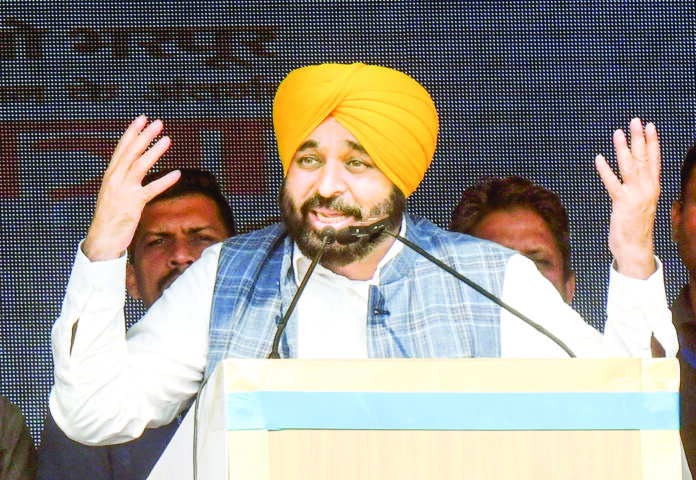
Punjab CM Bhagwant Mann announced Hindu Temple Act to grant temples independent management, boosting Hindu vote.
Chandigarh: In an attempt to woo the Hindu vote bank, Punjab Chief Minister Bhagwant Mann has announced that his government will soon introduce a law to give Hindu temples the right to manage their own affairs without government control.
If enacted, the Hindu Temple Act would fulfill the long-pending demand of Punjab’s Hindu Welfare Board, which has been campaigning for an independent body to manage temples in Punjab since 2012.
Mann’s statement came after Mahant Ravikant Muni, Chairman of the Hindu Welfare Board, repeatedly raised the demand to the Chief Minister, asserting that the Act would ensure the independent management of Hindu religious sites in the state without government interference.
Mann made the announcement during a meeting with the Hindu Welfare Board at Raj Bhawan, in the presence of Punjab Governor Gulab Chand Kataria. The meeting sent a strong message that the government is serious about addressing the concerns of the Hindu community. During the meeting, Mann reportedly assured the Board that the law will be drafted and implemented soon.
According to Chetan Dev, Secretary of the Hindu Welfare Board, the announcement came during a goodwill meeting held in the presence of Kataria. He said the Chief Minister assured that an official draft of this Act would be prepared soon and implemented.
In political circles, the announcement is seen as a smart political move by the Aam Aadmi Party (AAP) government, especially with the 2027 Punjab Assembly elections just two years away. Political observers believe this Act may also help the AAP counter the BJP’s Hindu outreach in the state.
“The idea of creating a Hindu Temple Act in Punjab is similar to the formation of the Sikh Gurdwara Management Committee in Haryana. Since the formation of HSGMC helped political parties win the support of the Sikh community, now AAP is eyeing similar support from Hindus in Punjab by creating the Hindu Temple Act,” said a political observer, adding that this step is likely aimed at winning the trust and support of Hindu voters, who make up about 39% of Punjab’s population.
Over the years, the Hindu Welfare Board has demanded that temples be allowed to function independently, without interference from government-appointed officials. Muni has repeatedly alleged that temples under government control in Punjab have continuously faced neglect, as no government has taken this issue seriously so far.
The Hindu Welfare Board argued that the Act would improve temple management and protect the religious sanctity of these places.
This move appears to be part of AAP’s strategy to expand its voter base beyond its traditional rural and Sikh supporters. In the 2022 elections, AAP gained power by focusing on governance reforms and anti-corruption promises, but the party was accused of not doing enough on religious or cultural issues that matter to Hindu voters.
Hindu temples in major urban areas like Amritsar, Jalandhar, Ludhiana, and Patiala have often complained about mismanagement by government committees. These cities have large Hindu populations, and the issue of temple autonomy is important to many voters there. The state has witnessed repeated Bhagwa protests by the Hindu Welfare Board since 2012 demanding the Hindu Temple Act.
Since AAP is on shaky ground in Punjab, with Mann facing a wave of anti-incumbency within three and a half years of his government in the state, the promise of the Hindu Temple Act seems an attempt to strengthen its ground in urban constituencies where the BJP has been trying to build support.
The BJP is likely to see this move as a challenge, especially since it has been the main party pushing Hindu-related issues. In the 2024 Lok Sabha elections, the BJP improved its vote share in Punjab to 18.56% (2.5 million votes), compared to 26% each for AAP and Congress, by focusing on such matters. Now, with AAP stepping into the same space, competition for the Hindu vote is expected to intensify.
Within AAP itself, several leaders had already shown support for the Hindu Temple Act during the 2022 elections by signing affidavits in favour of temple autonomy. These included ministers and MLAs from constituencies with large Hindu populations, showing that the party has been preparing for this step for some time.
Punjab has a diverse religious population, with Sikhs being the majority. AAP will need to ensure that the new law is inclusive and does not upset the state’s delicate social balance.
A senior functionary of the Hindu Welfare Board has also demanded that at least Rs 1,000 crore annually be allocated for the management of temples in the state, as many temples in Punjab are under government control and are in a state of neglect. It is the government’s responsibility to maintain these temples and ensure regular worship and religious activities, he added.
Meanwhile, the government has to ensure that the new system of temple management brings transparency and does not lead to misuse of funds or resources.







